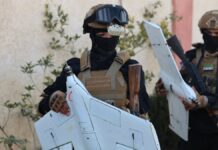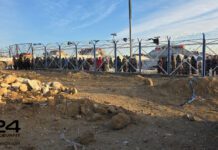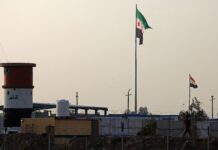
The Syrian revolution’s sweeping territorial gains in northern Syria have left regional powers Iran and Iraq facing difficult decisions as they navigate their respective roles in the ongoing conflict. With Assad’s forces losing ground and struggling to regroup, Iran and its allies face challenges in maintaining influence, while Iraq weighs the possibility of direct involvement despite official denials.
Iran is treading carefully in response to the ongoing Repelling the Aggression campaign, which has claimed key strongholds in Aleppo and Idlib, including Jabal Azzan and defense factories previously controlled by the Iranian Revolutionary Guard. Tehran’s ability to provide direct military support is constrained, with Iranian officials reportedly concerned about murky international understandings – potentially involving Russia – that aim to curtail Iran’s influence in Syria.
Sources indicate that Iran is reluctant to commit its own forces to northern Syria amid logistical challenges and military losses. Hezbollah, a long-time ally of Tehran in Syria, is reportedly unwilling to send reinforcements, as the group’s focus has shifted toward recovery following recent conflicts with Israel. According to regional officials, Hezbollah has withdrawn key leaders from northern Syria, and its leadership has resisted Tehran’s calls for involvement in this phase of the conflict.
To compensate for these gaps, Iran has turned to sectarian militias in Iraq, attempting to mobilize groups such as Harakat al-Nujaba and the Badr Organization. These militias have reportedly sent fighters into Syria in small groups to avoid detection, according to Iraqi and Syrian sources. However, reluctance among some factions, compounded by American and Israeli warnings, has limited the scale of these deployments.
While Iraqi leaders publicly deny involvement in Syria, reports suggest otherwise. Iraqi security sources and regional media confirm that hundreds of Iranian-backed Iraqi fighters crossed into Syria over the past week to bolster Assad’s forces in Aleppo and Idlib. This includes groups using unofficial border crossings and dirt roads to evade detection by coalition forces.
Despite official denials by the Popular Mobilization Forces (PMF), Iraqi rhetoric increasingly reflects a potential shift toward direct intervention. Military spokesman Yahya Rasool has described northern Syria as a haven for “terrorist organizations” and vowed to strike perceived threats to Iraqi national security, even beyond the border. These statements coincide with calls from the Iran-aligned Coordination Framework coalition for action to address what it describes as “terrorist occupation” in Syria.
At the same time, Sunni leaders in Iraq, including Khamis al-Khanjar, have called for restraint and urged the government to facilitate regional dialogue between Syrian revolutionary forces and Assad’s regime. This position reflects broader domestic concerns about Iraq becoming further entangled in Syria’s conflict at the behest of Iran.
The situation in eastern Syria has further complicated Iran and Iraq’s strategies. Recent US airstrikes targeted a convoy of Iranian-backed militias, including Iraqi and Afghan fighters, attempting to reinforce northern positions. The attack destroyed most of the convoy, highlighting the risks faced by Tehran’s proxies. The strikes followed rocket attacks by Iranian-aligned militias on US-linked positions in Deir Ezzor.
Amid these developments, Tehran’s reliance on Iraqi sectarian militias and Afghan Fatemiyoun fighters, accused of committing war crimes in Syria, demonstrates its constrained capacity to respond to ongoing advances by revolutionary forces. Iraqi political and military circles remain divided, with some advocating intervention to support Assad while others warn against deeper entanglement.
The evolving dynamics in Syria place both Iran and Iraq in precarious positions. Tehran’s diminished military presence and reliance on Iraqi militias signal a shift in strategy, but the effectiveness of this approach remains uncertain. Meanwhile, Iraq’s ambiguous role – officially denying intervention while factions cross the border – risks entangling Baghdad in a conflict that could strain its domestic and international standing. As Syria’s conflict intensifies, both Iran and Iraq face mounting challenges to their influence and security, with the potential for further regional instability looming large.








